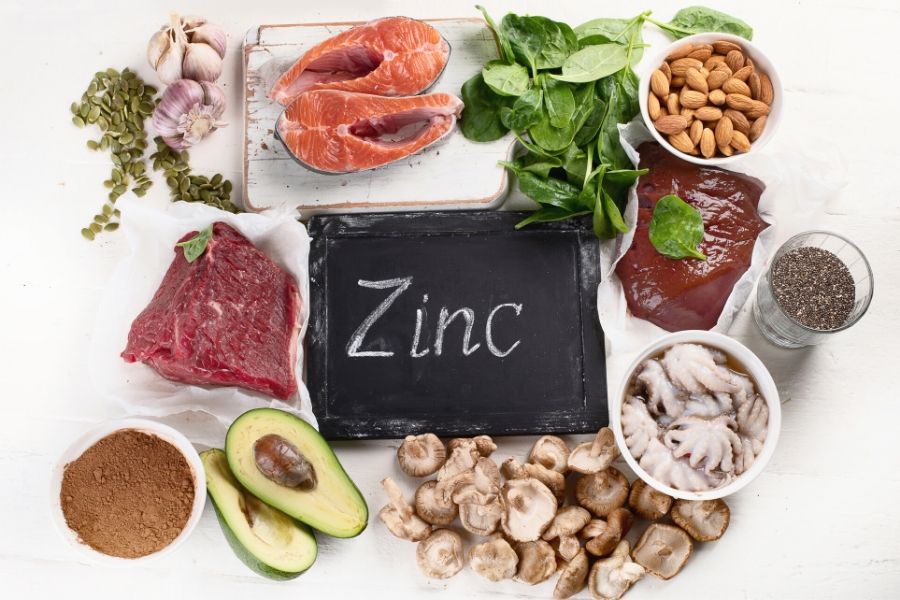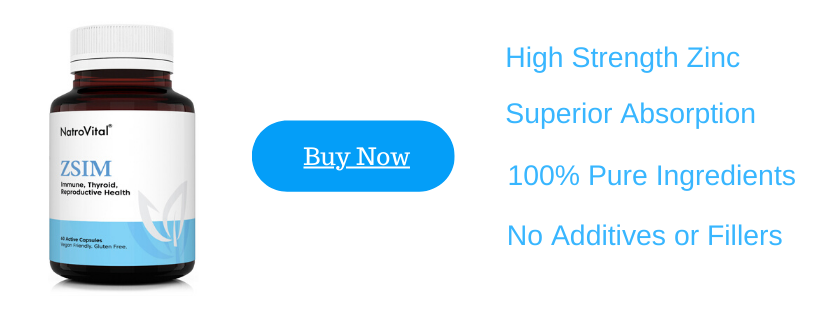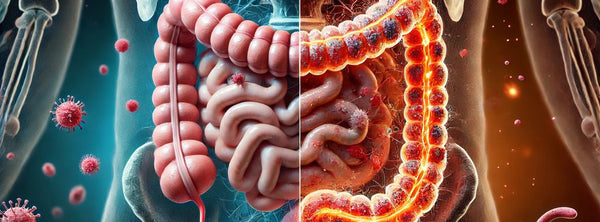
The Importance Of Zinc In Our Daily Diet
Zinc is an essential mineral that is involved in many bodily functions. It is required for the activity of over 200 enzymes, plays a vital role in immune function, wound healing, cell division, protein and DNA synthesis. Zinc also supports healthy growth and development during pregnancy, childhood and adolescence.
Sadly, 85% of Australian women and 67% of men are deficient in Zinc. This is due to many factors including;
|
|
|
|
|
|
|
|
|
|
|
|
|
|
|
|
|
|
|
|
|
|
|
|
|
|
|
|
|
|
Unfortunately maintaining adequate zinc levels can prove difficult, as there are no specialised zinc storage systems within the body. As such, It must be replenished daily from the diet.
Clinical Signs Of Zinc Deficiency:
-
White Spots on the Fingernails – White spots on the nails are a classic sign of zinc deficiency. Supplementing with zinc has shown to inhibit the formation of new white spots from appearing and increase blood zinc levels.
-
Poor Immune Function – Zinc is the commander and chief of the immune system and is essential for healthy immune cell function. A deficiency in Zinc can be an underlying cause of frequent colds, flu and infections. Zinc also helps to inhibit the excessive release of histamine from mast cells, which results in the symptoms of an allergic reaction. Zinc deficiency is likely to increase histamine production and result in allergies.
-
Poor Taste and Smell – Researchers have confirmed that people with zinc deficiency have a reduced sensation of taste and smell. Studies have found that zinc supplementation improves the body's taste and smell abilities.
-
Mood and Neurological Disturbances – Zinc plays an integral part in modulating the brain's response to stress. In fact, the highest levels of zinc in the body, is found in a part of the brain called the hippocampus, which regulates emotion, motivation, memory and learning. Zinc is also a cofactor for the manufacture of the neurotransmitters serotonin, GABA and dopamine. Deficiencies in these neurotransmitters can lead to anxiety, depression, insomnia, mood imbalances, poor focus, and memory. Zinc also helps protect our neurological system by improving BDNF (brain-derived neurotrophic factor), which helps maintain long-term memory by supporting the survival and growth of new brain neurons. It is no wonder why zinc is essential for proper mental, brain and nervous system function.
-
Gastrointestinal problems – Studies have shown that zinc supplementation helps strengthen the intestinal lining and protect against Leaky Gut Syndrome and helps heal the intestinal cells. Most gastrointestinal conditions including Chron's disease, Inflammatory Bowel Disease and Ulcerative Colitis benefit from zinc supplementation and often require higher levels because the intestinal absorption of zinc may be affected.
-
Skin complaints – It's common knowledge that zinc is good for the skin and is vital for wound healing. Low zinc levels might present with delayed wound healing or the appearance of stretch marks. More severe zinc deficiency may cause atopic dermatitis and a cracked, fissured appearance of the skin.
-
Thinning and greying hair – Alopecia or baldness is a well-known sign of zinc deficiency with hair growth occurring with zinc supplementation. Zinc is an essential cofactor needed for healthy thyroid function. Low zinc levels can lead to reduced thyroid health and can result in hair thinning and even alopecia.
Foods High In Zinc
Thankfully Zinc is found in many foods such as; meats, seafood, nuts and seeds. To receive your free copy of our 'List Of Foods High In Zinc' simply fill in your details below.
We hope you found this blog the 7 Clinical Signs of Zinc Deficiency useful, and if you did, please leave a comment or share on social media.
Thanks and have a great day!
The information provided in this blog' 7 Clinical Signs of Zinc Deficiency' is general and intended for educational purposes only. We make no claims to diagnose, treat, prevent, alleviate or cure illnesses or diseases with any information or product stated. With any health issue, we suggest you consult your healthcare professional before undertaking any health treatment.
References:
- Sandstead HH. Understanding zinc: recent observations and interpretations. J Lab Clin Med. 1994 Sep;124(3):322-7. PMID: 8083574.
- Solomons NW. Mild human zinc deficiency produces an imbalance between cell-mediated and humoral immunity. Nutr Rev. 1998 Jan;56(1 Pt 1):27-8. doi: 10.1111/j.1753-4887.1998.tb01656.x. PMID: 9481116.
- Prasad AS. Zinc: an overview. Nutrition. 1995 Jan-Feb;11(1 Suppl):93-9. PMID: 7749260.
- Simmer K, Thompson RP. Zinc in the fetus and newborn. Acta Paediatr Scand Suppl. 1985;319:158-63. doi: 10.1111/j.1651-2227.1985.tb10126.x. PMID: 3868917.
- Fabris N, Mocchegiani E. Zinc, human diseases and aging. Aging (Milano). 1995 Apr;7(2):77-93. doi: 10.1007/BF03324297. PMID: 7548268.
- Baghurst, K.I.; Dreosti, I.E.; Syrette, J.A.; Record, S.J.; Baghurst, P.A.; Buckley, R.A. Zinc and magnesium status of Australian adults. Nutrition Research. 1991; 11:23-32. doi.org.1016/S0271-5317(05)80147-2
- Hunt JR. Bioavailability of iron, zinc, and other trace minerals from vegetarian diets. Am J Clin Nutr. 2003 Sep;78(3 Suppl):633S-639S. doi: 10.1093/ajcn/78.3.633S. PMID: 12936958.
- Rink L, Gabriel P. Zinc and the immune system. Proc Nutr Soc. 2000 Nov;59(4):541-52. doi: 10.1017/s0029665100000781. PMID: 11115789.
- Marone G, Columbo M, de Paulis A, Cirillo R, Giugliano R, Condorelli M. Physiological concentrations of zinc inhibit the release of histamine from human basophils and lung mast cells. Agents Actions. 1986 Apr;18(1-2):103-6. doi: 10.1007/BF01987995. Erratum in: Agents Actions 1986 Aug;18(5-6):607. PMID: 2425567.
- Tran CD, Hawkes J, Graham RD, Kitchen JL, Symonds EL, Davidson GP, Butler RN. Zinc-fortified oral rehydration solution improved intestinal permeability and small intestinal mucosal recovery. Clin Pediatr (Phila). 2015 Jun;54(7):676-82. doi: 10.1177/0009922814562665. Epub 2014 Dec 16. PMID: 25520366.
- Sturniolo GC, Di Leo V, Ferronato A, D'Odorico A, D'Incà R. Zinc supplementation tightens "leaky gut" in Crohn's disease. Inflamm Bowel Dis. 2001 May;7(2):94-8. doi: 10.1097/00054725-200105000-00003. PMID: 11383597.
- Gupta M, Mahajan VK, Mehta KS, Chauhan PS. Zinc therapy in dermatology: a review. Dermatol Res Pract. 2014;2014:709152. doi: 10.1155/2014/709152. Epub 2014 Jul 10. PMID: 25120566; PMCID: PMC4120804.
- Almohanna HM, Ahmed AA, Tsatalis JP, Tosti A. The Role of Vitamins and Minerals in Hair Loss: A Review. Dermatol Ther (Heidelb). 2019;9(1):51-70. doi:10.1007/s13555-018-0278-6




